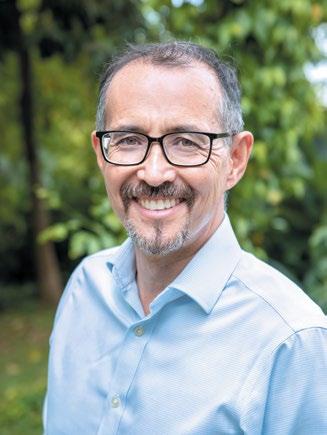

“There is more in us than we know if we could be made to see it; perhaps, for the rest of our lives we will be unwilling to settle for less.”
Kurt Hahn Founder, UWC Movement



“There is more in us than we know if we could be made to see it; perhaps, for the rest of our lives we will be unwilling to settle for less.”
Kurt Hahn Founder, UWC Movement
It is a fundamental truth that there is no such thing as stasis. We are all, as individuals and institutions, in the process of becoming.
At UWCSEA we have a rich and textured history that has brought us to the present—this unique moment between being what we were, and becoming what we will be. It is our Mission that will continue to guide us in this transformation, renewed and reimagined for today’s students and tomorrow's world.
Organisational theorist Henry Mintzberg once described strategy as being akin to the blinkers on race horses—something necessary to stop us from getting distracted. For us, the UWCSEA Strategy is our Mission come to life, for today and for the near future. It helps us to take the best of the past and create a new future. Our Mission and Strategy together provide the unwavering focus on both our deeper long-term purpose and on the students in front of us today.
It would be wonderful to be able to set out a full roadmap of the upcoming decade, one that clearly indicates the precise steps and processes we can follow. In truth such maps are impossible; but because we know our destination, we will create the path by walking it.
You will therefore see in these pages a strategy of four themes that is "more like a river than a rock" in that it can bend and remain responsive to what lies ahead. A horizon-scanning section outlines the research we completed as we devised our strategy with our community, while sections on our twin goals of peace and sustainability share our learning over 50 years of the UWC Mission in Singapore. In this context, our Strategy to 2030 emerges as a guide for the next decade, a sense of direction that imbues our individual actions with meaning, allowing us to experience the joy of a common purpose.
Just as we are a very different, much better school than we were 50 years ago, or even a decade ago, so too this strategy will slowly transform us once more. Our Mission has never been more necessary, a Strategy to bring us closer to that Mission never more urgent.
Join us.
Nick Alchin Head of College


As we look to the future, the worlds of education, work and technology look ever-more intertwined, and it is clear that the emergence of a peaceful and sustainable future will require cooperation, collaboration and solidarity. Future-ready students will need both broad and specialised knowledge that is interdisciplinary and intercultural, and that supports them in accessing and producing knowledge, while also developing their capacity to critique and apply it.
The future of our global society over the next 3050 years will depend on the policies and decisions made regarding climate change, the economy, technology, and geopolitical concerns. In a world that is increasingly volatile, uncertain, complex, and ambiguous (VUCA), there is a need for broader educational goals that include individual and collective wellbeing.
As we shape our strategy for the next ten years, we look to external research and the big themes and trends that will define our context and inform our decisions: the future of learning; the future of schools; the future of work; and the future of technology.
[1] Reference: <<list all sources from horizon-scanning>>
[2] The OECD Learning Framework 2030
The pandemic accelerated normalisation of hybrid and online learning models and gave us a deeper recognition of the importance of learner agency and personalised learning. At the same time, our time away from the social setting of school further highlighted and reinforced the fundamental importance of human relationships in learning, and in children's development generally. Skilled adults with the ability to connect students to their learning and to each other will continue to be central to a successful learning environment.
To make an impact in the future, students will increasingly need a range of knowledge, both disciplinary and interdisciplinary, as well as design thinking and systems thinking. They will also need a range of skills and capabilities, including cognitive and meta-cognitive skills, social and emotional skills and practical skills.2 Learning will need to allow for inclusive growth and equitable access.

Students will need to be comfortable working towards solutions to complex and ill-defined problems. Because so much will be in flux, everyone will be a learner, not only students but also teachers, school leaders and governors, parents and communities. Literacy and numeracy will remain foundational, including data and digital literacy.
We will be creating learning environments that support and motivate each student to find and follow their interests, make connections between different learning experiences and opportunities, and design their own learning projects and processes in collaboration with others. At the same time, our research has shown that the most impactful aspects of the UWC educational experience involve opportunities for interpersonal connections and autonomous learning, which often (although not exclusively) occur outside of formal classes.
Over the next 10 years, we will be relying on exceptional teachers and teams to help us reconcile the value of individualised pathways and learner agency with the merits of shared experience, learning from diversity, and the holistic, experiential UWC education, focused on knowledge, skills and values.
Enshrined in our UWCSEA Learning Principles is the notion of Learning as a social activity. The UWCSEA mission is all about uniting peoples, and we know that a strong sense of belonging comes from simply being together in shared spaces on campus (and not just from learning together).
Effective practices for supporting conceptual understanding involve classroom talk, visible thinking, and building teacher capacity to ‘read the room’ and check for understanding. While many digital tools attempt to replicate some of these strategies for virtual spaces, they are, on their own, poor substitutes for the complexity of a physical classroom where learning is taking place face to face.
Keeping learners safe extends beyond physical safety to include their identity development and mental wellbeing. The school as a physical location has the ability to bring together individuals of diverse backgrounds, support dialogue and intercultural understanding, as well as promote behaviours that support equity and inclusion and justice. By bringing students of diverse backgrounds, abilities and identities into classrooms and onto campus to collaborate and learn from each other, we model behaviours we expect our learners will engage in as they join society as adults. The campus acts as a positive space for these interactions to flourish.
Physical schools should model the futures we aspire to by becoming exemplars of sustainability. Buildings will be required to contribute to wellness matters in a systematic way with seven principles that cover: Air, water, nourishment, light, fitness, comfort, and mind.
Over the next 80 years, Singapore’s landscape will be spectacularly transformed through nature. Towering net-zero energy skyscrapers will double up as vertical gardens, while nature will increasingly dominate the city’s surface through forests and small rivers. Singapore will emerge as a decarbonisation expert for the world as net-zero cities require integrated renewable energy systems of unprecedented scales. UWCSEA will be part of that journey.
Over the next 10 years we will further develop our physical campuses as models of sustainability and safe spaces for students from diverse backgrounds, abilities and identities to learn and flourish together in an environment that supports belonging.
[3] Reference: List all sources from horizon-scanning

The idea of “work” will move still further from the idea of just completing tasks to providing value and managing relationships. A more diverse and flexible workforce, and changing ideas of what a workplace is, will also require adjustments to our notions of work. As automation and technology change the nature of work, we have a collective commitment to ensure that everyone can lead a decent life.
Fast-changing life cycles need not involve “front loading” formal education in a chunk of time spent in a school. Learning should happen across the course of our lives, and students need to be prepared with that mindset. Our young people will learn to be adaptable, to constantly learn-and-relearn, and in some cases to unlearn bias, prejudice, and divisiveness.
As the impact of automation and technology is increasingly dramatic, our commitment to a decent life for everyone becomes more challenging. If there is ‘not enough’ paid work for everybody to afford a decent life through their earnings, then the solution has to be broader than just “individual upskilling”.
The biggest structural barrier to increasing college completion rates and career success comes from a disconnect and misalignment between high school, higher education, and our workforce systems. Our students will require us to build greater interconnectivity between our existing systems.
Over the next 10 years we will be connecting the world of learning to the world of work in increasingly practical ways and will develop deeper external relationships with universities, industry and our alumni community.

Digital technologies should aim to support—and not replace— schools. In many ways, technology of “the future” is already here. Automation and AI will become increasingly embedded in our lives and are likely to be accompanied by an accelerated transformation of our cognitive abilities in intended and unintended ways.

Organisations globally are building metaverse strategic plans; tech investment by 7 of the top 10 companies in the world is based in metaverse related technologies. The gaming industry is driving the technology that is being used to build the metaverse which means that students are already participants in this change. However, the concept of the metaverse is expanding with a focus on the human need for connection and shared meaning-making. Technologies such as quantum processors, cryptocurrencies, blockchain, AR, MR and VR are converging on the metaverse as interoperable spaces where we can create and share meaning.
Technology is also transforming the ‘business’ of schools. Robotics and automation will enable us to create more efficient administrative processes in operations, reducing the staff required or freeing up staff for higher end tasks. In Singapore specifically, the government is driving these solutions as a means to reduce immigration for low-paid roles in the economy. Through a mix of investment and tightening of work pass requirements they will push organisations to adopt these solutions faster than we may see elsewhere in the world.
The increase in the use of digital tools for data keeping and identity management, plus the amount of personal sensitive data that schools hold, will make cybersecurity a central tenet of decision making. This issue is increased in a K-12 school due to the range of ages of the people involved and increased sensitivity when dealing with children's identities.
Over the next ten years we will navigate and leverage the disruption that technology can bring, keeping wellbeing and quality learning as our twin priorities, while embedding robust data protection systems.
[3] Reference: List all sources from horizon-scanning
The Guiding Statements provide a reference point for all decision-making at the College. The statements carefully connect our Mission and Educational Goal to the Learning Programme and the Wellbeing and Learning Principles that underpin it. Most importantly, they outline how the UWCSEA educational experience is designed so that students learn to live the UWC Mission.
















Our Strategy to 2030 and Beyond is underpinned by our Guiding Statements, which remain our constant reference even as we develop our programmes and respond to changes in the educational and global landscape.










































































































































































































































The Mission of the UWC Movement is to build build peace and a sustainable future through education. We believe that the two concepts of peace and sustainability are interdependent, that a sustainable future is a peaceful one. Only through a deeply-held conviction that peace and sustainability are humanity's most urgent challenges, and a heartfelt commitment to learning the skills and knowledge to begin making effective change, will we deliver on our responsibilities to one another and the planet.
As we shape our strategy, we look again at the profundity of these two concepts, at how far we have come in developing students who can enact our Mission, and on what more is left to do.
At UWCSEA, peacebuilding is explicitly taught and considered to be critical to the foundations of a healthy community and society. For us, peacebuilding means students possess competency in building peace in both local and global contexts. While it is an act of service, it is also recognised as a core capability and disposition that helps people achieve peace both personally for themselves, and for others in complex, real-world situations. Hearing the voice of youth in peacebuilding is necessary for any future global lasting peace.
Peace can occur across many levels. There can be peace within yourself or in your family, peace within a community and, at its largest consideration, peace between people, nations and cultures.
In practice, peace may also take many different forms. Negative peace is “the absence of violence and the absence of fear and violence”, according to the Institute for Economics and Peace, a non-profit think tank. However, in this state, while a society may be free from violence, its peace structures may still be fragile and lack the necessary frameworks to support them into the future. This in turn can result in a peace deficit, where peace can’t be sustained in the future by a society's internal socio-economic development and the institutions and support networks needed to maintain peaceful societies.6 We therefore seek the skills to build Positive peace—the peace that emerges when the attitudes, structures and institutions that underpin peace are in place, function well and can sustain individuals and societies.
At UWCSEA, students examine all potential aspects of peace, but the focus is on giving students the understanding, skills, and knowledge to help them build the structures and relationships that can help support the development of Positive peace, now and into the future.

The UWCSEA programme explores three key layers—or rings—of building peace. These layers help shape the way that peace is taught from the Primary School through to the senior years, and they intertwine with the five elements of the learning programme to contribute to the development of peacebuilding.
The first concept, forming the inner core of the peacebuilding rings, is personal peace, which starts with the ideas and concepts of identity, including an understanding of who a student is, their cultural self and a sense of self awareness.
The next ring is the concept of interpersonal peace. This relates to interpersonal relationships and the acceptance of differences, including an ability to appreciate different cultures and perspectives,
so that people know how to interact with each other and can understand each other’s different ideas of community peace. The third and outer ring is the concept of global peace, which includes resolution of international and intercultural conflicts, the role of youth as agents of change and advocacy, and peacebuilding in the wider global sense, including how we design the systems and institutional structures that might lead to a more peaceful future.
Starting from K1, these concepts guide curriculum development and each student’s experience of the learning programme throughout each their time at the school.
Broader than a single subject, UWCSEA’s peace education programme gives students a deep understanding of peace and the different ways it can be achieved through small and large actions. Peacebuilding is not something that is learned overnight. It’s about a profound appreciation of the concepts and the development of a mindset and the development of a mindset that makes students constructive contributors to peace. Peacebuilding is woven into the ethos of the College and a fundamental driver of all our activity.
Over the next 10 years, we will continue to develop students with the competency and desire to build peace in themselves, their communities and globally.
“Making peace is not necessarily about having a certain skill. It’s more about having a certain commitment to try and bridge the gaps in understanding within people, and trying to reach out to understand a different point of view … And that’s what UWCSEA tries to do.”
Professor KishoreMahbubani
Distinguished Fellow, Asia Research Institute, National University of Singapore
[6] Positive Peace Report 2020: Analysing the Factors that Sustain Peace, The Institute for Economics and Peace, 2020 https://www.economicsandpeace.org/wp-content/ uploads/2021/04/PPR-2020web.pdf
A core principle of the teaching and learning at UWCSEA is the understanding that peace is engendered by healthy societies, and peace is only possible through successful solutions that are sustainable for all. Building a sustainable future is an integral part of our mission, with educational strands embracing economic, political, social and environmental sustainable development topics woven throughout the holistic learning programme. Our commitment to sustainability has similarly shaped operational practices across the College.
Many people think of sustainability in terms of environmental factors; but it also includes economic factors, natural factors, social factors and political factors, all coming together. The concepts of sustainable development now embedded at UWCSEA encompass all three domains identified by the UN: environmental, social and economic.
In 1999, UWCSEA was at the forefront of the development of the transdisciplinary Environmental Systems Societies (ESS) course, an IB Diploma subject that is recognised globally as an exemplary model for learning in sustainable development. The ESS course explores applied systems thinking as a core topic, challenging students to understand how each part of an ecosystem interacts with and impacts other parts.
This decades-long experience in transdisciplinary curriculum development has meant that sustainability topics have been successfully embedded throughout the UWCSEA learning programme from Kindergarten to Grade 12. The approach continues to evolve, but UWCSEA has become a leader in sustainability in the international education community, as well as in Singapore through our operational commitments, where our building and facilities management are regularly shared as case studies in how local organisations could adopt a comprehensive approach to sustainability.
Monitoring and continuously improving the operations of a green campus – whether it was designed and purpose built, or created through innovative and thoughtful retrofitting – requires consistent, reliable data. In this, UWCSEA’s Facilities team has again led the way through a collaboration with Singaporean firm MNV to design and build our own unique data dashboard, with the goal of bringing all campus data under a single transparent process. The dashboard tracks water management, electricity, waste management, solar, and other live data points. This allows our Facilities team to identify and correct inefficiencies with the goal of increasing the sustainable operations of the campuses,

enhancing the school’s capacity to manage both short-term problem-solving and long-term development planning.
More than just a barometer of sustainability efforts on campus, the dashboard is a sustainability tool used by students and staff alike. Students have access to the dashboard and data through a new Campus Case Studies programme. In this, Primary, Middle and High School students visit the Facilities and Operations Centres to see first-hand how the dashboard works, what the various data points are, and to learn more about and contribute to decisions on sustainability projects on campus.
Sustainability learning doesn’t end at the gates of the school, however, and staff, often working together with engaged students, collaborate with suppliers to help them understand and improve their impact right down the supply chain. This includes the stationery suppliers who have moved to forest-friendly paper, food wholesalers who have stopped using unsustainable palm oil in products they supply through the canteen, uniform manufacturers who now source more environmentally friendly fabrics, and the bus company, who now wait until all students are boarded and ready to leave before they start the engines.
This ‘whole of school’ approach defines the way UWCSEA describes developing a mission competency. Education is a way for individual members to develop approaches that can be extended throughout the community. To this end, UWCSEA will be working with other schools and organisations for mutual benefit, including supporting the Singapore Green Plan 2030. Through these partnerships, we will be able to contribute to improvements in the sustainability of construction and building management across Singapore, as well as stay abreast of new developments that may help the College to further reduce its environmental impact.
Sustainability cannot be achieved alone. Advocacy is one of the cornerstones of education at UWCSEA and one of the key focuses for the future will be for UWCSEA to continue to share its lessons widely, with organisations in Singapore and beyond
United Nations Environment Programme, International Union for Conservation of Nature and World Wide Fund For Nature in Caring for the Earth: A Strategy for Sustainable Living, 1991
Over the next 10 years, we will deepen our commitment to a sustainable future through continuing to develop students with a deep understanding of systems thinking, while furthering partnerships at an organisational level.
“Sustainable Development is improving the quality of human life while living within the carrying capacity of supporting ecosystems.”









The proper role of Strategy is to liberate us, so that we can focus on the students in front of us without distraction.
If we do not know where we are going or even where we want to go, every fork in the road becomes a site of ambivalence; how do we know if we want to end up where a particular road leads? If we have a destination in mind, and a broad set of guardrails to guide us, we can focus on making the most of where we are.



We will continue to provide exceptional educational experiences, guaranteeing a holistic and values-driven, rigorous education that will contribute to a peaceful and sustainable future.
We will attract, retain outstanding people and build our organisational strength and capacity.
We will ensure that our learning is rich in experiences, relationships, and connections people, places, organisations
We will create and sustain sense of belonging members of our community, present and future.
We will leverage our curiosity and pioneering drive incremental and innovation, and sustainable
Our Strategy to 2030 and Beyond provides a framework for our futurefocus over the next ten years. A successful Strategy will ensure our students continue to experience a world-class education, supported by outstanding teachers and teams and a diverse, caring College community where everyone belongs. Our commitment to our Mission will lead us to explore possibilities that will result in a peaceful and more sustainable future.
Our Strategy is underpinned by our Guiding Statements and informed by current thinking on the future of learning, schools, work and technology.

Our Strategy builds on our worldclass education and contains four Strategic Commitments. These Commitments will inform our strategic priorities each year and ensure a whole College approach to our development. This development will take place
in a context where our first commitment and starting point will continue to be providing a world-class education for our students and the fulfilment of our inspirational mission to make education a force to unite people, nations and cultures for peace and a sustainable future.
retain and grow and teams, organisational capacity. our students’ experiences, connections to organisations and ideas. sustain a for all community, past, our sense of pioneering spirit to and disruptive sustainable change.

















UWC makes education a force to unite people, nations and cultures for peace and a sustainable future.



We will attract, retain and grow outstanding people and teams, and build our organisational strength and capacity.
Compared to any other aspect of school, teachers have the single biggest impact on student learning. At UWCSEA, we see each adult in the building are teachers and role models for our young people. We must commit to ensuring that all our staff are outstanding professionals who care deeply about education and young people, and who are masters of their craft. They must be supported by systems and processes that promote efficiency and effectiveness, resulting in a strong and resilient organisation.
We will do this through:
1. Providing a joyful, enriching professional environment that promotes connection, autonomy and competence for each individual
A sense of competence and mastery arises when we feel effective and can continually develop craftsmanship around our work. Autonomy allows us to make our own meaning of events, and we feel connected when we feel known by others and have a sense of shared purpose. These conditions support a sense of wellbeing for staff, complemented by professional learning opportunities that ensure a sense of development and growth.
2. Implementing systems and processes that make our work together effective and efficient and build in compliance and accountability
Systems and processes must support the core educational work of the College and ensure efficiency of operations. Our financial strategy and practices must guarantee the sustainability of the College for future generations. Our commitment to compliance and risk management will be expressed through our behaviours as well as our systems. We will take a strategic approach to workforce planning, and implement structures that promote accountability for each member of our team.

Our definition of immersive learning is when students are deeply engaged in the challenge and joy of deep and holistic learning; when the school experience speaks not just to the intellect but also to values, character and aspirations. Immersive learning leads to lifelong impact, and to the sense of obligation to apply learning for the greater good. It is our responsibility to ensure that students have multiple ways of accessing this way of learning, through a wide variety of pedagogical approaches, as well as rich experiences outside of the classroom.
Our programme is one of constant growth and discovery, through which we best learn about ourselves and the world around us. Our students are not just passive receivers of information, but active participants in their own learning. By engaging in significant hands-on experiences, students connect the learning between head, heart and hands. By creating their own meaning, and not having it handed to them, students are encouraged to take risks, learn from their mistakes, and so not only help build confidence and resilience, but also inspire creativity and innovation.
Our network of like-minded individuals and organisations extends to our sister schools in the Movement, our alumni network, our partner organisations, universities and industry. Most of all we are connected to Singapore and our local communities, where there are many opportunities for mutual exchange and learning. In a world that demands collaborative solutions, our students will benefit from a deeper connection to the world outside of UWCSEA.
We will ensure that our students’ learning is rich in experiences, relationships, and connections to people, places, organisations and ideas.

We will create and sustain a sense of belonging for all members of our community, past, present and future.
Schools are defined by the relationships that exist within them. UWCSEA is committed to being a community where all individuals have a sense of belonging, and where different identities and ways of being are respected and valued. We recognise belonging for all as an outcome of our individual and collective behaviours, and that just as our current community finds belonging, so too must our past community (alumni), and future community (potential families and staff members).
We will do this through:
1. Extending access so that more students have the opportunity to experience a UWC education, regardless of circumstance or background
Ensuring that we can enrol and support the success of more scholars, more students with learning differences and more students from differing socioeconomic backgrounds is a key part of our future success. Our strength and unity lies in our diversity, and extending access will provide a more enriching experience for everyone.
Our Mission demands that we are an open, inclusive community containing a multitude of perspectives and ways of being. We will develop and foster positive relationships in our community through interactions that are open, honest, meaningful and joyful and recognise the full humanity of each member of our community. We will also continue to improve and deliver an inclusive and equitable Learning Programme, which honours the diverse and multi-faceted identities of all students in our community, and recognises the opportunities presented by the diversity of our staff members.

We will leverage our sense of curiosity and pioneering spirit to drive incremental and disruptive innovation, and sustainable change.
The story of UWCSEA is a story of effort, risk, innovation and adventure. Building on Kurt Hahn’s assertion that “There exists within everyone a grand passion, an outlandish thirst for adventure, a desire to live boldly and vividly through the journey of life”, we have always pushed the boundaries of what a truly mission-aligned education can be.
We will do this through:
1. Exploring bold ideas to maintain UWCSEA’s position as a global leader in education
Prime Minister Lee Kuan Yew, on opening UWCSEA in 1971 said that “Amongst other things, [UWCSEA] could be a source of new ideas, of new teaching and learning methods, innovations tested and proved sound and practical can be adapted and adopted.” Since being the first school in Asia to adopt the IB Diploma, to build a dedicated Outdoor Education Centre and to make Service Learning compulsory for all students, the College has continued to pursue new innovations in education.
Not every innovation can be disruptive but sometimes a new approach to teaching for sustainability can, in time, bring about transformational change. The College will continue to support teachers and support staff in developing incremental innovations. We recognise the transformative impact of small changes compounded over time and will avoid complacency, instead seeking continuous improvement.
